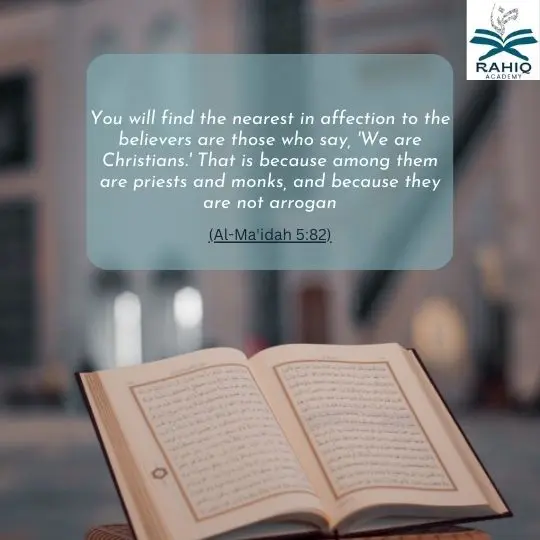Islam and Christianity, two of the largest religions in the world, have much in common, but also some key differences. The Quran provides valuable guidance on how Muslims should approach their relationships with Christians. It emphasizes respect, kindness, and cooperation while maintaining distinct Islamic beliefs. This article explores how the Quran addresses Christianity, highlighting Quran verses about Christianity, their interpretations, and providing context for Muslim-Christian relationships.
What Does the Quran Say About Christians?

The Quran acknowledges Christians as the “People of the Book” (Ahl al-Kitab) and recognizes their religious devotion. The Quran praises Christians for their humility and faith in several instances. In Surah Al-Ma’idah (5:82), Allah says:
English:
“You will find the nearest in affection to the believers are those who say, ‘We are Christians.’ That is because among them are priests and monks, and because they are not arrogant.”
Arabic:
لَتَجِدَنَّ أَقْرَبَهُمْ مَوَدَّةً لِلَّذِينَ آمَنُواْ ٱلَّذِينَ قَالُوٓاْ إِنَّا نَصَٰرَىٰ ۚ ذَٰلِكَ بِأَنَّ مِنْهُمْ قِسِّيسِينَ وَرُهْبَانًۭا وَأَنَّهُمْ لَا يَسْتَكْبِرُونَ
(Al-Ma’idah 5:82)
This verse highlights the positive relationship between Muslims and Christians based on shared values of humility and religious devotion. The Quran encourages Muslims to treat Christians with affection and respect.
Quran’s Gentle Approach Towards Christians
The Quran’s gentle approach towards Christians is evident in multiple verses that promote peaceful interaction and fairness. Surah Al-Mumtahina (60:8) provides a general principle for dealing with non-Muslims, including Christians:
English:
“Allah does not forbid you from those who do not fight you because of religion and do not expel you from your homes – from being righteous toward them and acting justly toward them. Indeed, Allah loves those who act justly.”
Arabic:
لَا يَنْهَاكُمُ اللَّهُ عَنِ الَّذِينَ لَمْ يُقَاتِلُوكُمْ فِي الدِّينِ وَلَمْ يُخْرِجُوكُمْ مِنْ دِيَارِكُمْ أَنْ تَبَرُّوهُمْ وَتُقْسِطُوا إِلَيْهِمْ ۚ إِنَّ اللَّهَ يُحِبُّ الْمُقْسِطِينَ
(Al-Mumtahina 60:8)
This verse underscores the importance of treating Christians and others who live peacefully with Muslims in a just and fair manner. It further strengthens the Quranic call for mutual respect and understanding.
Can a Muslim Be Friends With a Christian?

Islam permits Muslims to form respectful relationships, including friendships with Christians. However, these relationships should not compromise one’s faith.
Surah Al-Mumtahina (60:8) supports this, as mentioned above, reinforcing that peaceful and kind treatment is encouraged unless there is hostility.
Additionally, Muslim scholars interpret certain verses regarding alliances or friendships with non-Muslims as contextually specific to political or military circumstances. Friendship based on mutual respect and cooperation is allowed, provided the core Islamic values are maintained.
Quran’s Directive on Interactions with Christians
The Quran strongly emphasizes the need for kindness in interactions with Christians. Surah Al-Ma’idah (5:5) allows Muslim men to marry chaste Christian women, highlighting a significant example of permitted closeness:
English:
“And [lawful in marriage are] chaste women from among the believers and chaste women from among those who were given the Scripture before you…”
Arabic:
وَٱلْمُحْصَنَٰتُ مِنَ ٱلْمُؤْمِنَٰتِ وَٱلْمُحْصَنَٰتُ مِنَ ٱلَّذِينَ أُوتُواْ ٱلۡكِتَٰبَ مِن قَبۡلِكُمۡ
(Al-Ma’idah 5:5)
This verse illustrates the Quran’s approach of fostering familial bonds between Muslims and Christians while ensuring the preservation of Islamic values in interfaith relationships.
Commonalities Between Islam and Christianity
The Quran highlights several commonalities between Islam and Christianity, starting with the belief in God. Both Muslims and Christians share a reverence for Jesus (peace be upon him) and his mother, Mary (Maryam, peace be upon her). Surah Maryam (19:30) speaks about Jesus as a prophet:
English:
“He [Jesus] said, ‘Indeed, I am the servant of Allah. He has given me the Scripture and made me a prophet.'”
Arabic:
قَالَ إِنِّي عَبْدُ اللَّهِ آتَانِيَ الْكِتَابَ وَجَعَلَنِي نَبِيًّا
(Maryam 19:30)
While Christians believe in the divinity of Jesus, Muslims view him as one of the greatest prophets sent by Allah. This shared respect for Jesus and Mary forms a significant common ground between the two faiths.
Differences Between Islam and Christianity
Despite the shared values, key differences between Islam and Christianity exist, particularly in the theological understanding of God and Jesus. In Islam, Tawhid, or the absolute oneness of Allah, is a foundational principle. The Christian belief in the Trinity, which includes God the Father, God the Son (Jesus), and the Holy Spirit, is rejected by Islam.
Surah Al-Ma’idah (5:72) addresses the theological divergence on Jesus:
English:
“They have certainly disbelieved who say, ‘Allah is the Messiah, the son of Mary'”
Arabic:
لَقَدْ كَفَرَ الَّذِينَ قَالُوا إِنَّ اللَّهَ هُوَ الْمَسِيحُ ابْنُ مَرْيَمَ
(Al-Ma’idah 5:72)
The Quran emphasizes that Jesus is a prophet, not divine, and cautions Muslims against accepting beliefs that compromise the concept of God’s oneness.
The Qu’ran’s Warnings Regarding Christianity
The Qu’ran’s Warnings Regarding Christianity,while advocating respect, the Quran also warns Muslims about certain Christian theological positions, particularly the deification of Jesus and the concept of the Trinity. Surah At-Tawbah (9:30) explicitly warns against attributing divinity to Jesus:
English:
“The Jews say, ‘Ezra is the son of Allah’; and the Christians say, ‘The Messiah is the son of Allah.’ That is their statement from their mouths…”
Arabic:
وَقَالَتِ الْيَهُودُ عُزَيْرٌ ابْنُ اللَّهِ وَقَالَتِ النَّصَارَى الْمَسِيحُ ابْنُ اللَّهِ
(At-Tawbah 9:30)
Muslims are encouraged to engage with Christians in ways that respect differences but avoid adopting beliefs that contradict Islamic teachings.
Conclusion
In conclusion, the Quran offers valuable guidance on fostering relationships between Muslims and Christians. It emphasizes kindness, respect, and peaceful interaction while maintaining theological clarity. By adhering to the principles of compassion, justice, and understanding, Muslims can build positive relationships with Christians, contributing to a harmonious, diverse world.
For those seeking deeper insights into Islamic teachings on interfaith relations, Rahiq Academy offers courses on Fiqh, Quranic studies, and much more.
Visit Rahiq Academy to learn how Islam encourages building bridges between people of all faiths. As the Quran says:
“Invite to the way of your Lord with wisdom and good instruction, and argue with them in a way that is best”
ادْعُ إِلَىٰ سَبِيلِ رَبِّكَ بِٱلْحِكْمَةِ وَٱلْمَوْعِظَةِ ٱلْحَسَنَةِ
By following these Quranic teachings, Muslims can contribute to a world of peace and mutual respect.




